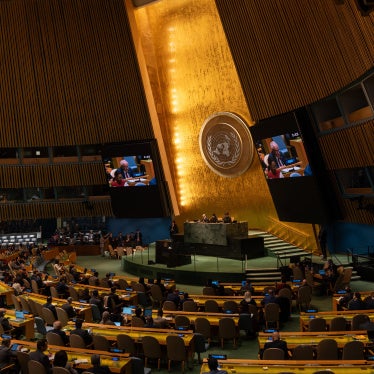The prospect of a new international treaty on forced disappearances is the top achievement of this year's United Nations Commission on Human Rights, which ends April 27,2001 in Geneva.
Human Rights Watch also welcomed the adoption of a critical resolution on Russia's conduct in Chechnya, and the extension of the mandate of the Special Representative on Iran.
The practice of forced disappearances plagues many parts of the world, including Algeria, Colombia, Iraq, and Sudan, as well as Chechnya in Russia. Although other treaties address certain aspects of forced disappearance, Human Rights Watch said a special treaty was needed to spell out the obligations of states to prevent the practice.
Members of the Commission agreed on April 23 to begin negotiations on a global accord against forced disappearances.
"The possibility of a convention on disappearances is a significant victory for the human rights movement," said Joanna Weschler, United Nations representative at Human Rights Watch. "Years of work lie ahead, but we've made a very important first step."
The initiative to move ahead on the disappearances was led by France and several Latin American countries. The United States, India, Canada, and a handful of others tried to block the initiative, but were defeated.
Human Rights Watch voiced disappointment that the United States voted against a resolution addressing human rights violations in the Israeli-occupied West Bank and Gaza Strip, while European Union states abstained. Weschler agreed with the U.S. position that the resolution should have included reference to Palestinian abuses, but said the U.S. delegation refused to negotiate with the sponsors to improve the text in this regard.
Human Rights Watch said it deeply regretted the passage of the no-action motion on China that prevented the Commission from even discussing the human rights situation in that country, and it criticized the resolution on Rwanda, which praised "progress" in restoring the rule of law, and effectively will end the work of the human rights Commission in Rwanda.
At the outset of the session, Human Rights Watch expressed grave concern at the human rights records of several incoming members of the Commission and called on U.N. member states to elaborate criteria for Commission membership. Human Rights Watch urged that countries willing to serve on the Commission should issue standing invitations to the monitoring mechanisms created by the Commission. During the current session, twenty-nine governments issued such standing invitations, bringing the total to thirty-three U.N. member states.
Among the new members, Algeria, Kenya, Libya, Saudi Arabia and Vietnam, voted almost without exception as a bloc on country resolutions, and in most cases voted to defeat these resolutions.
"We are dealing here with a phenomenon that can be described as abusers' solidarity," said Weschler. "Countries violating human rights are very unlikely to favor ostracizing other violators. This situation needs to be stopped."
Human Rights Watch called on the U.N. Economic and Social Council, which will be electing a new class of Commission on Human Rights members next week, to avoid electing governments that routinely violate the rights of their citizens.







